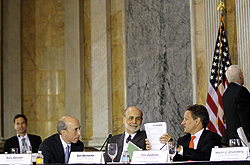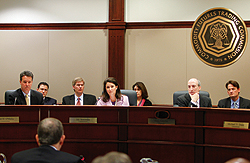A Message from the Chairman

Gary Gensler, chairman of the Commodity Futures Trading Commission speaks at the George Washington University Law School on October 23, 2009 in Washington, DC. The law school held a symposium on regulatory reform and the response to the financial crisis. (Photo by Mark Wilson/Getty Images)
I am pleased to present the Agency Financial Report for Fiscal Year 2011. It chronicles a critical time in the history of the Commodity Futures Trading Commission (CFTC) as the agency works to implement the historic Dodd-Frank Wall Street Reform and Consumer Protection Act (Dodd-Frank Act).
Three years ago, the financial system failed, and the financial regulatory system failed as well. We are still feeling the aftershocks of these twin failures.
There are many lessons to be learned from the crisis. Foremost, when financial institutions fail, real people's lives are affected. More than eight million jobs were lost, and the unemployment rate remains stubbornly high. Millions of Americans lost their homes. Millions more live in homes that are worth less than their mortgages. And millions of Americans continue struggling each day to make ends meet.
Secondly, it is only with the backing of the public sector that many financial institutions survived the 2008 crisis. A perverse outcome of the crisis may be that people in the markets believe that a handful of large financial firms will – if in trouble – have the backing of taxpayers. But when challenges to firms arise, it is critical that taxpayers are not forced to pick up the bill – financial institutions should be free to fail.
Third, the financial system is very interconnected – both here at home and globally. When one financial institution fails or comes under significant stress in the markets, other financial institutions and our economy also are put at risk.
Lastly, while the crisis had many causes, it is evident that swaps played a central role. Swaps added leverage to the financial system with more risk being backed by less capital. They contributed, particularly through credit default swaps, to the bubble in the housing market. They contributed to a system where large financial institutions were thought to be not only too big to fail, but too interconnected to fail. Swaps – developed to help manage and lower risk for end-users – also concentrated and heightened risk in the financial system and to the public.
Dodd-Frank Reform
In 2010, Congress and the President came together to pass the Dodd-Frank Act. The law gave the Commodity Futures Trading Commission (CFTC) oversight of the $300 trillion domestic swaps market, a market so big there are now more than $22 of swaps for every dollar of goods and services produced in the U.S. economy. At such size and complexity, it is essential that these markets work for the benefit of the American public; that they are transparent, open and competitive; and that they do not allow risk to spread through the economy.
The CFTC has substantially completed the proposal phase of the rule-writing process required by the Dodd-Frank Act. We held 20 public meetings and issued more than 50 proposed rules on the many important areas of reform called for by the new law, including transparency, clearing, market integrity and regulating swap dealers.

WASHINGTON - JULY 18: (2nd L-R) Chairman of the U.S. Commodity Futures Trading Commission Gary Gensler, Chairman of Federal Reserve Board Ben Bernanke, and U.S. Secretary of the Treasury Timothy Geithner chat at the end of the open session of the Financial Stability Oversight Council (FSOC) meeting July 18, 2011 at the Treasury Department in Washington, DC. The meeting was focused on the one-year anniversary of the Dodd-Frank Wall Street Reform and Consumer Protection Act. (Photo by Alex Wong/Getty Images)
The CFTC has benefited from significant public input throughout this process. We have received more than 25,000 comment letters. CFTC staff and Commissioners have met more than 1,100 times with market participants and members of the public to discuss the rules, and have held more than 600 meetings with domestic and foreign regulators. We also have conducted 14 public roundtables on Dodd-Frank.
This summer, the agency turned the corner and began finalizing rules to make the swaps marketplace more open and transparent for participants and safer for taxpayers. To date, we have finished 18 rules, and we have a full schedule of public meetings into next year.
Promoting Transparency
The Dodd-Frank Act will bring needed transparency to the swaps markets. The more transparent a marketplace is, the more liquid it is, and the more competitive it is. When markets are open and transparent, price competition is facilitated, and costs are lowered for companies and their customers. Transparency shifts information from derivatives dealers to the public, which helps promote economic activity throughout the entire economy.
To promote transparency, we have completed rules that, for the first time, give regulators and the public specific information on the derivatives market's scale and risk. These rules will require large traders to give the CFTC data about their swaps activities and establish swap data repositories, which will gather information on all swaps transactions. By contrast, in the fall of 2008, there was no required reporting about swaps trading.
Moving forward, we are working to finish rules relating to the specific data that will have to be reported to regulators. These reforms will provide a window into the risks posed by the system so regulators can effectively police the markets for fraud, manipulation, and other abuses. We are also looking to finalize real-time reporting rules, which will give the public critical information on transactions – similar to what has been working for decades in the securities and futures markets. In addition, we are working on final regulations for trading platforms, such as Designated Contract Markets, Swap Execution Facilities, and Foreign Boards of Trade – all of which will help make the swaps market more open and transparent.
Lowering Risk Through Clearing
Another significant Dodd-Frank reform is lowering risk to the economy by mandating central clearing of standardized swaps. Centralized clearing protects banks and their customers from the risk of the bank failing. Clearinghouses reduce the interconnectedness between financial entities. They have lowered risk for the public in the futures markets since the late 19th century. Last month, we finalized a rule establishing risk management and other regulatory requirements for derivatives clearing organizations.
I am hoping to soon finish a rule that will enhance customer protections regarding where clearinghouses and futures commission merchants can invest their funds. The market events of the last three years have underscored the importance of maximizing protection of customer funds.
We also are looking to finalize rules on segregation for cleared swaps. Segregation of funds is the core foundation of customer protection.
In addition, after the first of the year, we hope to finish rules on client clearing documentation, straight-through processing, and the end-user exemption.

Scott O'Malia and Jill Sommers, commissioners of the U.S. Commodity Futures Trading Commission, left, to right, and Gary Gensler, chairman of the U.S. Commodity Futures Trading Commission, listen to Don Heitman, special counsel of market oversight division with the CFTC, speak during a meeting at the CFTC in Washington, D.C., U.S., on Tuesday, Oct. 19, 2010. The top U.S. commodities regulator today approved a rule that will require traders to report over-the-counter swaps based on raw materials including oil and corn, a prelude to trading limits. (Andrew Harrer/Bloomberg via Getty Images)
Market Integrity
To enhance market integrity, we finished a rule giving the Commission more authority to effectively prosecute wrongdoers who recklessly manipulate the markets. We also finalized a rule to reward whistleblowers for their help in catching fraud, manipulation, and other misconduct in the financial markets.
We recently completed speculative position limit rules that, for the first time, limit aggregate positions in the futures and economically equivalent swaps market.
To further support market integrity, we are looking to finalize guidance on disruptive trading practices as well as regulations for trading platforms.
Regulating Dealers
It is also crucial that swap dealers are comprehensively regulated to protect their customers and lower risk to taxpayers. The CFTC is working closely with the Securities and Exchange Commission and other regulators to finalize a rule further defining the term swap dealer. We are also looking to soon consider final external business conduct rules to establish and enforce robust sales practices in the swaps markets, as well as internal business conduct rules, which will lower the risk that dealers pose to the economy. In addition, the agency has been working closely with other regulators, both domestic and international, on capital and margin.
Agency Reorganization
With an expanded mission due to the Dodd-Frank mandate, the CFTC's new responsibilities called for an agency restructuring, which was implemented on October 9, 2011.
The Commission created a new group for oversight of swap dealers and intermediaries. The Division of Swap Dealer and Intermediary Oversight will facilitate standing up the new regulatory regime for the swaps marketplace.
In addition, technology will play a critical role as the CFTC executes its expanded oversight and surveillance responsibilities. The Commission reorganized its technology programs by establishing a new group, the Office of Data and Technology, which reports to the Chairman's office. The office will focus the Commission's needs and functions, integrate existing analytical capabilities, and facilitate a comprehensive approach to developing advanced technology investments, automation of regulatory functions and improved analysis.
Resources
As the CFTC finalizes these Dodd-Frank rules, the agency needs additional resources consistent with the CFTC's significantly expanded mission and scope. The swaps market is seven times the size of the futures market that we currently oversee. With seven times the population to police, greater resources are needed for the public's protection. Without sufficient funding for the agency, the nation cannot be assured of effective enforcement of new swaps market oversight rules that will promote transparency, lower risk, and protect against another crisis.
With increased funding comes the need for heightened accountability to show results and manage costs. The CFTC places a strong emphasis on being an effective steward of its operating funds. I am pleased that for the seventh consecutive year, the Commission has received an unqualified opinion on its financial statements. For the fifth consecutive year, the auditors disclosed no material instances of noncompliance with laws and regulations. I can also report that the CFTC had no material internal control weaknesses and that the financial and performance data in this report are reliable and complete under Office of Management and Budget guidance.
Conclusion
The current debt crisis in Europe is but a stark reminder of the financial market's interconnectedness. Furthermore, it is precisely during times of heightened market uncertainty that transparency is even more essential. While European leaders are working to avert a deepening crisis, it is critical that we implement the Dodd-Frank Act to protect the American public and strengthen our economy.
We must never forget the eight million lost jobs – the majority of which were lost by people who never used derivatives. We must never forget what the nation went through three years ago, and we continue to recover today. We must never forget the risks are still out there.
Gary Gensler
November 14, 2011



